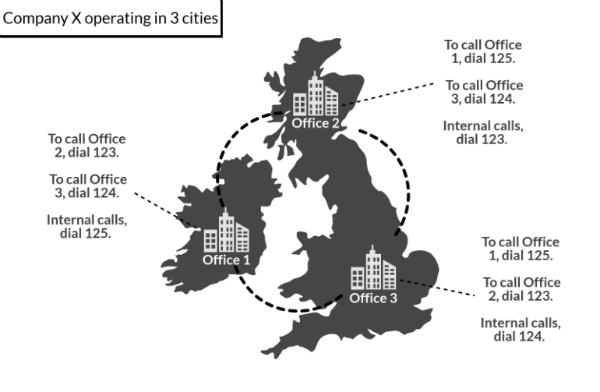Answer these simple questions and we will find you the BEST prices
Which type of solar quotes do you need?
It only takes 30 seconds
100% free with no obligation

Get up to 4 quotes from our selected suppliers by filling in only 1 form

Save money by comparing quotes and choosing the most competitive offer

Our service is 100% free and with no obligation
- Market-Inspector.co.uk
- Telephone Systems
- Internal Telephone System
Internal Telephone System

Internal Telephone Systems to Improve Communication
Spending money on internal telephone systems can boost your customer satisfaction and therefore your company’s success. That’s why in today’s market, where customer service and communication are a crucial part of daily operations, business telephone systems are a must.
Internal telephone systems enable businesses to be easily accessed, customers to be adequately forwarded to the right employee, and many other functions which make correspondence way easier than before internal telephone systems were a thing.
However, in bigger companies with many office locations, communication between employees is equally important as with customers. Exchanging and coordinating information between departments is fundamental in order to make the workload time-effective. Although, it can be difficult without having a well-functioning internal telephone system. For this purpose, many companies have implemented specially designed office telephone systems.
What Is an Internal Telephone System?
In broad terms, an internal telephone system is an additional phone line connected to a PBX (Private Branch Exchange) system. The PBX system is hardware-operated by a switching device, which is entirely programmable to fit the business’ needs. An internal telephone system has most of the features of outside lines, making call monitoring and cross communication not only simpler but also cheaper. A key function of PBX systems is that they are connected internally and use phone extensions to enable in-office calls.
If you are interested in getting professional advice about internal telephone systems or would like to find the best telephone system for your business, please fill in the form at the top of this page. It takes just one minute and you can receive up to 4 tailor-made, non-binding quotes from our experienced suppliers, free of charge.
How Do Internal Telephone Systems Work?
After the PBX sytem within a company is set up, a number of internal telephone lines can be added to it, which enables employees to call colleagues in the office by using a phone extension. What they need to do is simply dial an additional number so the PBX can recognise that this is an internal call.
Outside of the office calls are transferred and connected to the Public Switched Telephone Network (PSTN), by typing a specific number in order to place the call and send a signal to the PBX system telling it that this is an outside call.

What Are the Benefits of an Internal Telephone System?
One of the most significant advantages of an internal telephone system is the high efficiency it provides. It is a great way to establish a more coordinated communication system for your business at a low cost.
Better Internal Communication
Various departments and project coordinators often need to be in touch throughout the working day. Even with advanced communication technology, exchanging emails for example cannot reach the level of effectiveness that direct communication can.
Internal telephone systems make it easier for employees to work together on customer enquiries and get a quick solution to a work related problem, without causing any unnecessary costs for the company or time delay for the customer.
Cost Saving
Using internal linking and phone extensions saves your business the cost of using the Public Switched Telephone Network (PSTN). If employees were to communicate by outside lines, like they do with customers, companies would be paying close to double on their current phone expenses.
The implementation of internal telephone systems is significantly cheaper than installing a VoIP system, for example. On the other hand, VoIP providers can offer more advanced options for businesses. As a middle option companies may decide to install hybrid telephone systems that can be enitrely tailored, but for a higher price of course.
Flexibility and Accessibility
Internal telephone systems are flexible in that they are easily scalable. Additional phone lines can be added for expanding businesses as well as various extra features for easy access and managerial monitoring. Conference calling, voicemail, call recording and forwarding are also applicable internally and are accessible from different locations, rather than one centralised unit.
Internal telephone systems can also have extensions to reach other facilities such as fax machines and portable computers.
Improved Customer Relations
If a business has 10 phone lines for both their customers and employees, there is a high chance that many customers won’t be able to reach employees right away or there will be a long waiting time for them to get in touch.
Since communication between employees is often very frequent, this leaves less free lines for customers. This can be avoided with an internal phone system, which leaves all the outside lines of the business solely for customer calls.
Can All Firms Benefit From Having an Internal Telephone System?
As internal telephone systems can be useful for everyone, they are a big asset for medium-sized enterprises or businesses with many office locations. Companies, whose main operation is through customer communication, such as consulting services can benefit from internal telephone systems as well.
Before making the decision to implement an internal telephone system, companies should take into consideration their size, expansion objectives and communication needs.
Although, there are specially designed telephone systems for small businesses, most of the time when a company operates through a small centralised office, internal phone systems are not necessary for efficient functioning of processes.
Of course, if the specific business is located in different cities or counties, has a high customer enquiry flow, and is looking for further penetration to other places, internal telephone system can be of huge benefit for them.
Find the Best Internal Telephone System Providers in the UK
Shifting from a public phone line to an internal telephone system may incur some changes, but fortunately, internal telephone systems are not highly complex and do not require specialist training or learning courses. All they need to learn is the various extension numbers so they know how to get in touch with departments and divisions.
Moreover, an internal telephone system is not hard to implement since it is an attachment to a PBX system and doesn’t require high and frequent maintenance. It is highly adaptable to any business’ needs since it allows many functions and can easily be broadened with business growth.
Many companies are already convinced that internal telephone systems are a valuable asset to their business, given that it reduces cost and adds value to business processes and customer communication.
Since customer satisfaction is a key objective for most modern companies, the flow of information both outside and inside the company is extremely important for successful coordination between activities, leading to greater process efficiency.
If you also want to improve the communication within your company and would like to purchase an internal telephone system, please fill in the form at the top of this page. We will make sure you receive the best possible offer by giving you up to 4 tailor-made, non-binding offers from our suppliers, free of charge.
Fill in the form in just 1 minute

Natalie is a Content Manager at Market Inspector. She is educated in media & communications, and has several years of international experience in marketing and content creation. Natalie’s focus lies in the areas of finance, business communications, sustainability, and more. She and her content team have been published in reputable sites like HubSpot, Comm100, SiteProNews, Small Business Trends, Value Walk, and more.
We strive to connect our customers with the right product and supplier. Would you like to be part of Market Inspector?

- Internal Telephone Systems to Improve Communication
- What Is an Internal Telephone System?
- How Do Internal Telephone Systems Work?
- What Are the Benefits of an Internal Telephone System?
- Can All Firms Benefit From Having an Internal Phone System?
- Find the Best Internal Telephone System Providers in the UK?
